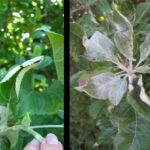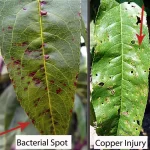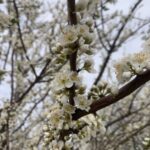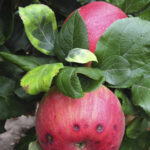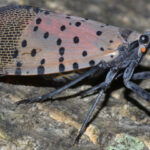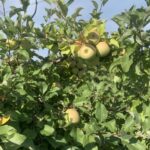All that new, succulent growth needs to be protected to prevent primary (and even secondary!) scab (Fig. 1). We’re past the point where copper can be safely used, so protectant fungicides for scab control at this stage include mancozeb, ziram and captan. As an added bonus, all of these protect against the summer rots, and[Read More…]
Apples
As of right now, we simply do not know if we will have crops from our woody fruit producing plants, from apples to grapes to peaches. Remember: The ability to produce fruit is determined in the spring with flower development. Any factor, whether abiotic, insect or pathogen, that interferes with flower development will impact fruit[Read More…]
The Purdue Meigs Horticulture Facility in Lafayette, Indiana just south of campus is looking lively this time of the year. All our fruit crops and trees have begun development. I know last year I said we had a warm winter and early spring but this year was much warmer and earlier. I was working fields[Read More…]
In Indiana, our ‘normal’ or average weather is one of extremes, punctuated with an occasional glorious summer day of sun and 76 degrees F. This year has been one of flooding and droughts, freezes and scorching heat. Again. With these weather extremes come physiological disorders and summer fruit rots, for those lucky enough to even[Read More…]
The Spotted Lanternfly is an invasive planthopper native to East Asia. It was introduced to the US in 2014 in Eastern Pennsylvania and has since spread to 13 other states including Indiana. The Spotted Lanternfly has 70+ host species including the invasive Tree of heaven (Alianthus altissma), grapes, apples, stone fruit, vegetables, hops, walnuts and[Read More…]
Making the decision on when to harvest can be a very tricky and complicated issue. The longer you intend to store the fruit, the more precise your timing needs to be. For summer apples, most growers only intend to store fruit until their higher quality fall apples come on stream, so storage times beyond a[Read More…]
Control Of Preharvest Drop with NAA: Preharvest drop refers to the process where fruit fall from the tree prior to harvest. Not all apple varieties are affected, but with some, such as McIntosh and Pristine, pre-harvest drop can be extreme. Several growth regulator materials are available to growers to help reduce pre-harvest drop. These materials[Read More…]
